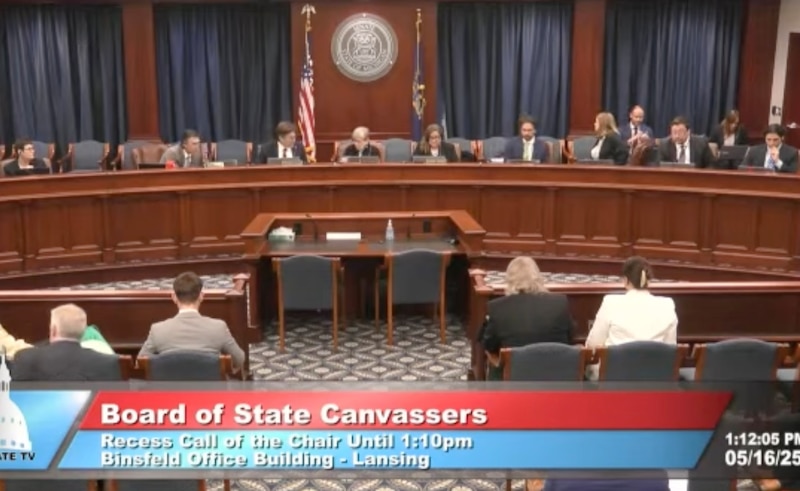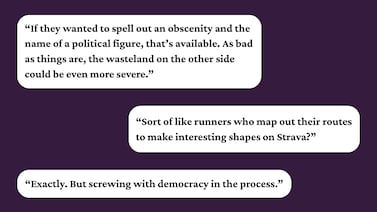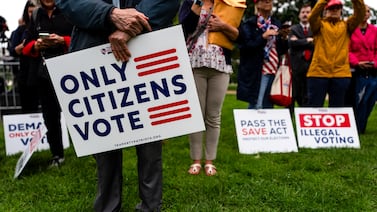Votebeat is a nonprofit news organization reporting on voting access and election administration across the U.S. Sign up for Votebeat Michigan’s free newsletter here.
The Michigan Board of State Canvassers approved summary language for a second proof-of-citizenship ballot initiative, setting the state’s voters up to weigh in not only on whether they want such a requirement in the state Constitution but also on how strict they want those requirements to be.
Americans for Citizen Voting won unanimous support from the board Friday for a 99-word summary of its new ballot initiative, and can soon begin collecting the nearly 450,000 signatures from registered voters that are required to get the question on the 2026 ballot
The proof-of-citizenship proposal from ACV, a product of the Virginia-based libertarian Liberty Initiative Fund, follows another one from the Committee to Protect Voters’ Rights, which won unanimous board approval last month for the summary of its proposal.
The two initiatives are similar: Both would require new voters — and possibly currently registered voters — to prove their U.S. citizenship, , and both would eliminate the option for voters who lack a photo ID to sign an affidavit attesting to their identity.

Still, board members focused mainly on the differences between the proposals.
The ACV proposal, for instance, could set Michigan up to maintain two separate voter lists, as Arizona does — one for those who have proven their citizenship and can vote in all elections, and one for those who haven’t and who could only vote only in federal races. The proposal also introduces penalties for registrants and election officials who violate its provisions.
Both Republican and Democratic members of the bipartisan board expressed concerns about the intent of the second initiative. Richard Houskamp, a Republican and the chair of the board, said he feared the proposed penalties would allow for “weaponizing” against other voters. Board Vice Chair Mary Ellen Gurewitz, a Democrat, said she believed the proposal would have “a seriously injurious effect on the voters of Michigan.”
Voters “ought to understand that your proposal is dramatically different from the one that we previously considered,” Gurewitz said to representatives of Americans for Citizen Voting.
But the board’s obligation at Friday’s hearing was to finalize the summary language that appears on petitions. State law requires the summary to be not more than 100 words, accurate in its description of the proposal, unbiased, and written “using words that have a common everyday meaning to the general public.” Petitioners are allowed to gather signatures without getting their language approved by the board, but most opt to come before the canvassers to ensure their effort isn’t later thrown out for not meeting those requirements.
Getting to accurate and unbiased language took several hours. Board members debated among themselves and with representatives from both ACV and CPVR on what should be included.
“I think what’s been done to the summary is a fair way to put it in front of Michigan voters,” Houskamp said of the proposal summary.
While the summary was approved, the form it will appear on was not: After a few typos were discovered in the proposed amendment to the constitution, ACV withdrew its request for approval of the form and said it will bring it back for approval in June.
The twin ballot proposals in Michigan are part of a conservative push across the country to require voters to prove their citizenship before registering to vote or casting a ballot. Michigan Republicans have focused on the effort since at least the fall, when a University of Michigan student from China was found to have cast a ballot in the November election despite not being a citizen. A further review from the state found 15 other noncitizens who may have cast a ballot in the general election.
House Republicans first introduced a proposal to amend the constitution earlier this year that would require voters to show documentary proof of citizenship, but it so far has failed to gain enough support to move to the Senate. The Citizens to Protect Voters’ Rights initiative is nearly identical to that proposal.
To get on the ballot in 2026, each petition initiative would need to get nearly 450,000 signatures from registered voters. If both make it, and both win approval from a majority of voters, the one with more yes votes would be the one that amends the Michigan Constitution.
Hayley Harding is a reporter for Votebeat based in Michigan. Contact Hayley at hharding@votebeat.org.





